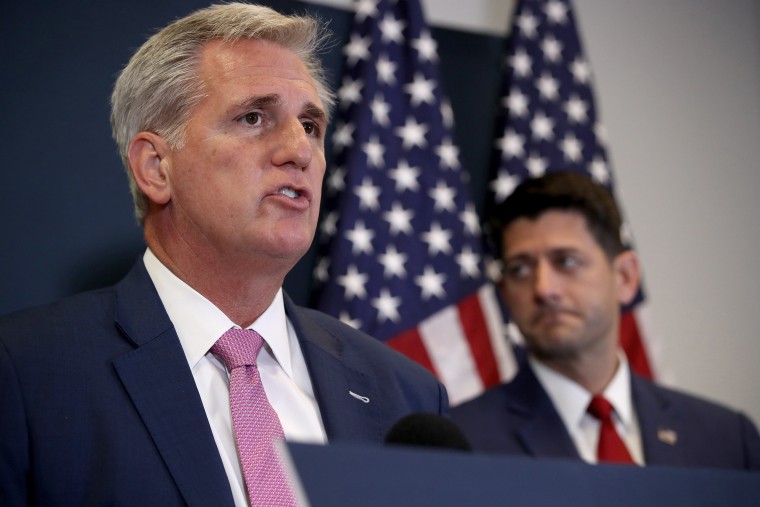WASHINGTON — House Majority Leader Kevin McCarthy could complicate post-election efforts to fund the government with his new proposal to provide $25 billion for a wall along the southern border.
McCarthy, who is expected to run for House speaker (or minority leader should Republicans lose control of the House), has put forward a bill to fully fund the president’s border wall request.
But the proposal is already receiving a negative reception from both parties in the Senate.
"This is kind of a new twist so to speak — a significant twist," Sen. Lisa Murkowski, R-Alaska, who sits on the Appropriations Committee, said, adding that she’s now "a little bit worried" about the ongoing negotiations over the spending bill.
Congress, which has funded much of the government for next year already, has put off funding for the Department of Homeland Security and a few other agencies until Dec. 7, leaving decisions on paying for any part of a border wall, one of President Donald Trump’s priorities, until after the midterm elections.
The House version of the appropriations bill provided $5 billion for the wall and the Senate has included $1.6 billion in their version, a difference that was already putting the two chambers and parties at odds. A proposal to drastically increase that number could provide additional tumult.
Sen. Richard Shelby, R-Ala., chair of the Appropriations Committee, said it’s a stretch.
"To go from $1.6 to $25 billion is what I call a quantum, huge leap, and I don’t know where the money would come from unless the White House shows us where to cut," Shelby said.
McCarthy's proposal could serve to further engage the president and lead to a protracted fight and possibly a partial government shutdown over one of Trump's unfulfilled campaign promises. And internal party politics are at play as McCarthy attempts to win the support of the most conservative members of his caucus in any potential bid for speaker.
If Democrats win back the House or the Senate, the lame-duck session before the new Congress takes over in January could be the last opportunity for at least two years for Trump to fund the wall.
But Republican senators are not keen on the price tag. When asked if Congress would pay $25 billion this fiscal year up front, Sen. Roy Blunt, R-Mo., a member of leadership laughed.
Sen. Jon Tester, D-Mont., a member of the Appropriations Committee, also scoffed at the cost.
"Who calls him a fiscal conservative? That’s crazy," Tester said of McCarthy, adding that a secure border is important but a technological wall is a better alternative than a purely physical one.
Sen. Rand Paul, R-Ky., said that $25 billion is an "inflated" number.
"My main complaint about the debate on border security is that many usually fiscally conservative members of Congress all of a sudden are for some sort of dollar amount, like you have to prove how much you are really for a wall," Paul said.
When Congress returns after the midterms, they will have less than a month to determine the amount of funding for border security, which is likely to be the most controversial issue left to fund.
House Speaker Paul Ryan said at a news conference Monday that Congress would “have a big fight” over border security. His office said he was referring to the $5 billion request that the House wants compared to the $1.6 billion Senate request. Senate Majority Leader Mitch McConnell told The Washington Examiner on Friday that he will push for $5 billion in the Senate bill.
Republicans who want to fully fund the wall point to previous negotiations with Democrats who agreed to authorize the amount. But those discussions were also paired with protections for 1.8 million people who came to the U.S. as children, which are not included in this appropriations bill.
